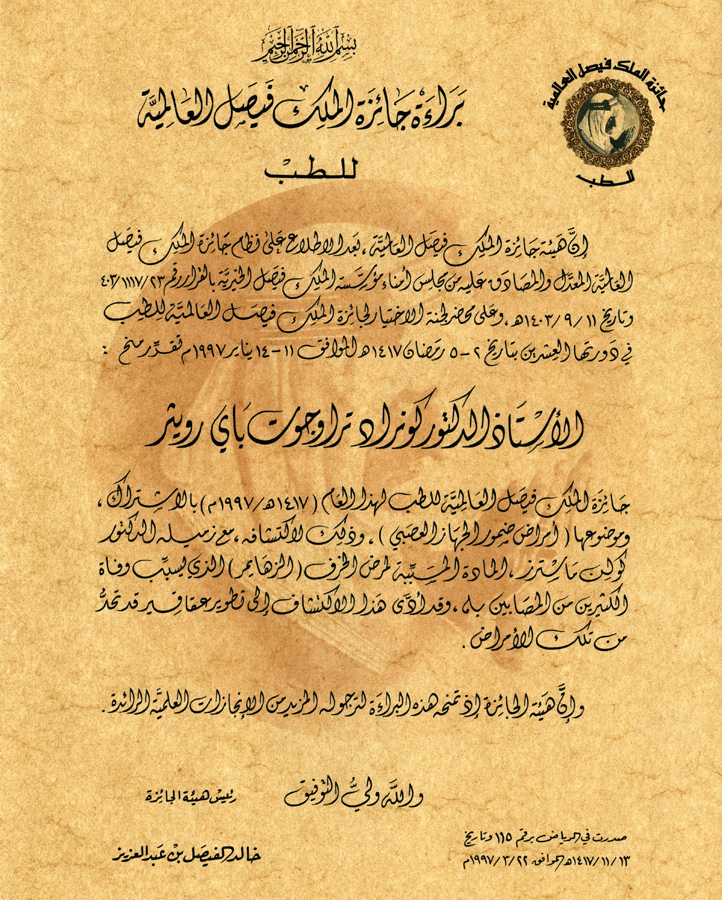

Professor Konrad Beyreuther
King Faisal Prize in Medicine 1997 Laureate
Topic: "Degenerative Diseases of the Nervous System"
Understanding normal brain function and its diseases is the only strategy I can think of to find ways out of the dilemma that Alzheimer’s disease will affect almost all humans sooner or later in their lives directly as a sick person or indirectly as a relative of a patient

Konrad Beyreuther graduated with a B.Sc. from Ludwigs-Maximilian University of Munich and a Ph.D. in Protein Chemistry from the Max Planck Institute for Biochemistry in Munich. He completed his post-doctoral training in protein chemistry, molecular biology, and genetics at the Institute for Genetics in Cologne University (Germany), the Biological Laboratories at Harvard University (USA), and the MRC Laboratory for Molecular Biology at Cambridge University (U.K.). He obtained his Habilitation in Genetics from Cologne University and became a Professor in the Department of Biochemical Genetics at the Institute of Genetics at Cologne, before moving, in 1987, to the University of Heidelberg as a Professor of Molecular Biology and the Director of the Laboratory of Molecular Neuropathology.
Professor Beyreuther, jointly with Colin Masters, made significant advances in the molecular biology and chemistry of amyloid plaques that characterize the development of Alzheimer’s disease (AD). They determined the amino acid sequence of a major protein constituent of amyloid plaques and established model systems for in vitro and in vivo studies of amyloid formation in AD. These studies opened new avenues of research into the molecular biology, genetics and pathogenesis of AD that could lead to the development of novel ways to prevent its occurrence or slow down its progression. He also conducted detailed studies of synaptic dysfunction in AD. Earlier in his career, he succeeded, in collaboration with British scientists, in identifying the scrapie-associated protein in the brains of experimentally infected animals.
Professor Beyreuther published numerous scientific papers in international journals. His outstanding contributions to the study of neurodegenerative disorders, particularly AD earned him numerous awards and honors. He received the Gunther Buch Award for Research on Aging in 1987, Robert Pfleger Award for Medical Research in 1988, Feldberg Prize for Anglo-German Scientific Exchange in 1989, Potamkin Prize for Alzheimer’s Disease Research in 1990, Metropolitan Life Foundation Award for Medical Research in 1991, IPSEN Foundation Prize in 1991, Max Planck Prize for International Scientific Collaboration in 1991, and Klaus-Joachim Zulch Prize for Neurology in 1995. He was also awarded an honoris causa degree in Medicine from Kuopio University, Finland in 1996 and the Windermere Traveling Professorship at Melbourne in 1997. He is a Member of the Heidelberg Academy for Humanities and Natural Sciences and Deutsche Akademie der Naturforscher Leopoldia in Halle and corresponding member of the Gottenger Academy for Sciences and Natural Sciences.
Professors Beyreuther and Masters have identified a protein known as 13A4 that is a major component of the amyloid plaques and have shown that a gene on chromosome 21 encodes for this protein which is part of a lamer protein called amyloid precursor protein (APP). They later studied the regulation of the synthesis and function of APP and its ability to bind to metallic ions. They hypothesized that the abnormal accumulation of pA4 protein underlies the neuronal changes that lead not only to Alzheimer’s disease but also to other degenerative diseases such as Creutzfeldt-Jakob disease, Their research has opened the way to the rational development of novel drugs that can interfere with these pathological processes in hopes of offering some chance of limiting or ameliorating these devastating diseases in the near future. They have published 124 joint papers relating to this field as well as numerous other individual papers.
This biography was written in the year the prize was awarded.
- He held several positions including:
- State Secretary for Life Sciences, member, and scientific advisor of the government of the State of Baden-Wuerttemberg in 2001-2006.
- Senior Professor Emeritus at Heidelberg University in 2007.
- He co-founded Prana Biotechnology Limited in 1997.
- He received many awards including:
- Henry Wisniewski Prize in 2002.
- Federal Cross of Merit from the Federal Republic of Germany in 2004.
- Lennox K. Black International Prize in 2006



